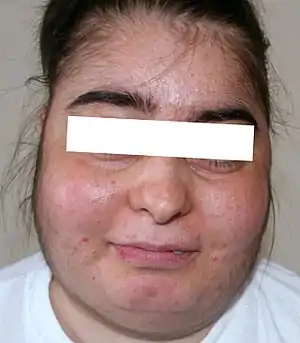Moon face
A Moon face[2] is a medical sign in which the face develops a rounded appearance (reminiscent of the "Man in the Moon") due to fat deposits on the sides of the face.[3]
| Moon face | |
|---|---|
| Other names | Moon facies,[1] Cushingoid facies, Cushing's-like face |
 | |
| A moon face as a result of steroid use (patient age 30). | |
| Treatment | removal of the tumor on ACTH secreting cells of the pituitary |
Symptoms and causes
Moon face is often associated with Cushing's syndrome[4][5] or steroid treatment (especially corticosteroids), which has led to it being known as Cushingoid facies.[6]
Moon face is a type of corticosteroid-induced lipodystrophy along with "buffalo hump", which in one study occurred in 47% of the 820 patients. Moon face is among the most frequently reported adverse events of systemic glucocorticoids, along with insomnia (58%), mood disturbances (50%), and hyperphagia (49%).[7]
Another long-term study of 88 patients on prednisone showed that lipodystrophy, such as moon face, was the most frequent adverse event, suffered by 63% of patients.[8]
Incidence
The risk for moon face increases with higher doses and longer time on steroid treatment. One study showed an increased risk in women, those younger than 50 years of age, and those with a high initial BMI.[9]
Complications
This change in facial appearance can be very distressing to patients taking steroids.[10] Later studies of the 88 patients showed that those who suffered lipodystrophy had a greater risk for metabolic syndrome characteristics such as increased blood pressure, higher plasma concentrations of fasting glucose, triglycerides, and total cholesterol, along with lower HDL-cholesterol.[11]
Treatment
Cessation of steroid therapy or treatment of the cause of Cushing's syndrome causes moon face to slowly decrease and eventually vanish. One study proposed that limiting calories could decrease the risk of corticosteroid-induced lipodystrophy.[12]
References
- "Moon facies - definition from". Biology-Online.org. 2009-09-07. Retrieved 2013-05-22.
- Wilkins, L.W. (2008). Nurse's Five-minute Clinical Consult: Signs and symptoms. Wolters Kluwer Health/Lippincott Williams & Wilkins. p. 364. ISBN 9781582557038. Retrieved 2015-06-12.
- "Moon Facies: Causes and Treatment". webmd.com. Retrieved 2015-06-12.
- Goldman, Lee (2011). Goldman's Cecil Medicine (24th ed.). Philadelphia: Elsevier Saunders. pp. 343. ISBN 978-1437727883.
- Buliman, A.; Tataranu, L. G.; Paun, D. L.; Mirica, A.; Dumitrache, C. (January 2016). "Cushing's disease: a multidisciplinary overview of the clinical features, diagnosis, and treatment". Journal of Medicine and Life. 9 (1): 12–18. ISSN 1844-3117. PMC 5152600. PMID 27974908.
- Bricker, S.L.; B C Decker; Langlais, R.P.; Miller, C.S. (2001). Oral Diagnosis, Oral Medicine, and Treatment Planning. B.C. Decker. p. 540. ISBN 9781550092066. Retrieved 2015-06-12.
- Morin, Clément; Fardet, Laurence (December 2015). "Systemic glucocorticoid therapy: risk factors for reported adverse events and beliefs about the drug. A cross-sectional online survey of 820 patients". Clinical Rheumatology. 34 (12): 2119–2126. doi:10.1007/s10067-015-2953-7. ISSN 1434-9949. PMID 25956956. S2CID 21395473.
- Fardet, L.; Flahault, A.; Kettaneh, A.; Tiev, K. P.; Généreau, T.; Tolédano, C.; Lebbé, C.; Cabane, J. (July 2007). "Corticosteroid-induced clinical adverse events: frequency, risk factors and patient's opinion". The British Journal of Dermatology. 157 (1): 142–148. doi:10.1111/j.1365-2133.2007.07950.x. ISSN 0007-0963. PMID 17501951. S2CID 31057174.
- Fardet, Laurence; Cabane, Jean; Lebbé, Céleste; Morel, Patrice; Flahault, Antoine (October 2007). "Incidence and risk factors for corticosteroid-induced lipodystrophy: a prospective study". Journal of the American Academy of Dermatology. 57 (4): 604–609. doi:10.1016/j.jaad.2007.04.018. ISSN 1097-6787. PMID 17582650.
- Hale, Elizabeth D.; Radvanski, Diane C.; Hassett, Afton L. (July 2015). "The man-in-the-moon face: a qualitative study of body image, self-image and medication use in systemic lupus erythematosus". Rheumatology (Oxford, England). 54 (7): 1220–1225. doi:10.1093/rheumatology/keu448. ISSN 1462-0332. PMID 25550393.
- Fardet, L.; Cabane, J.; Kettaneh, A.; Lebbé, C.; Flahault, A. (July 2007). "Corticosteroid-induced lipodystrophy is associated with features of the metabolic syndrome". Rheumatology (Oxford, England). 46 (7): 1102–1106. doi:10.1093/rheumatology/kem062. ISSN 1462-0324. PMID 17409127.
- Fardet, L.; Flahault, A.; Kettaneh, A.; Tiev, K.-P.; Tolédano, C.; Lebbe, C.; Cabane, J. (May 2007). "[Systemic corticosteroid therapy: patients' adherence to dietary advice and relationship between food intake and corticosteroid-induced lipodystrophy]". La Revue de Médecine Interne. 28 (5): 284–288. doi:10.1016/j.revmed.2006.12.013. ISSN 0248-8663. PMID 17391811.
External links
| Classification | |
|---|---|
| External resources |